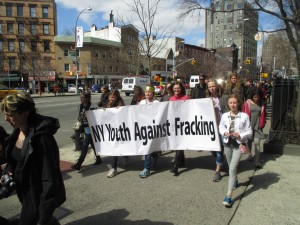Sustainability Education and Media Literacy

Originally appears in the Fall 2014 issue
“HOW MANY OF YOU know young people who feel fear about the future of the planet?”
All hands went up among those of us attending the “Beyond Green” symposium on education for sustainability. At a subsequent “Sustainability Salon” the majority of the large audience agreed that business as usual will likely lead to systemic collapse. One participant summarized, “Our house is on fire and we don’t know what will happen.” Many heads nodded in assent. Fear for the future. Systemic collapse. The uncontrollable fire. Where do these themes, located at the core of our common concerns, fit in the curriculum of our classrooms?
While some educators are of the mind; “Yes! We’ve got to push against the socially organized denial that’s keeping us from doing what we must in a time of grave global crisis.”[i] Others propose, “Such gloom and doom talk will only confuse the possibility of hope which is all we have to save us in a time of environmental despair.”[ii]
Choosing critical conversations
As a curriculum writer specializing in materials related to sustainability I wonder:
How can I design materials that create a container that is large and safe enough for students to engage in collective reflection on the strong emotions – fear, anger, despair, loneliness – that often rise in response to work around sustainability? How can we help teachers prepare to deal with the emotional experiences of students and within themselves when raising these issues?
Caution often rules. In the teacher’s lounge I’m told, Things may get out of hand if we allow students to articulate the depth of these problems. Across the table a parent says I do my best to shield my child from the dark side of humanity. At the community meeting an organizer proclaims, Discussion of overpowering emotions just becomes a descending spiral, turning us away from the urgent action that is required.
But caution will not save us from this conversation. Skipping over difficult and emotional material will not help our students develop the honesty, resiliency and courage that is required to face our present moment. A review of articles on the research into the emotional impact of earth changes offers insights into the necessity to engage with deep emotions as our children reflect on the world they have been born into:
“Feelings of sadness, devastation, and grief are rational responses to climate change.” (Klein)
“Repression of emotions such as fear, pain, guilt, or despair requires and contributes to commonly observed ‘cultural ailments’ including passivity on potentially relevant issues. “ (Moser & Dilling)
“Teachers who limit the amount of controversial content may actually allow students’ negative emotions about a topic to remain in place, and thereby limit their instructional engagement.” (Lombardia & Sinatra)
In my curriculum writing for Project Look Sharp’s media literacy lessons I urge teachers and students to question the biases in all media constructions including textbooks, lectures and this article. Some of my own biases include the belief that systems thinking about sustainability must include consideration of the emotional lives of students and teachers, and collective reflection and critical thinking must ground our pedagogy.
To view the photo-rich magazine version, click here.
If you are not already a subscriber, please subscribe to read the full article
Sox Sperry is a Program Associate and curriculum writer for Project Look Sharp, a media literacy initiative of Ithaca College in upstate New York. He has authored 13 curriculum kits for Project Look Sharp including a series on media constructions of sustainability: food, water and agriculture; chemicals, resources and endangered species; social justice and peace movements and U.S. presidential campaigns.
[i] Norgaard, K.M., Living in Denial: Climate Change, Emotions, and Everyday Life, MIT Press, 2011.
[ii] Kelsey, E., & O’Brien, C., “Sustainable Happiness, “ Green Teacher, Summer 2011, pp. 3-7.
Leave a Reply
You must be logged in to post a comment.





